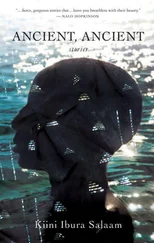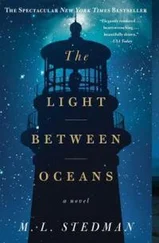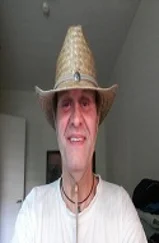One morning, she woke with a pop, like the string on a bow snapping. She sat up and the room was a watery blur. Yelling, she made it down the steps to where her mother was standing in the morning sunlight that came through the high foyer windows. “I think something is wrong,” she said. Her eyes were bleeding. She had to go to school for three days with bandages across both eyes. For three days the edges of the whispers in the rooms and halls were sharpened. Every poisoned sibilant and each spiteful plosive expanded to fill the whole of her sensory experience. Rather than listen to the teacher talk about long division and Kentucky history and sedimentary rocks, she heard nothing but a swarm of empty sounds that she was certain were meant for her. After the bandages came off, her eyes were still red for several days and framed by large new glasses, and the boys in line for lunch leaned over and asked if her face was getting its period and then, so proud of themselves, they couldn’t even laugh. One boy who’d been held back two years sat next to her during lunch while the other smaller boys watched and he put his hand on her leg and told her that she was really getting nice titties and even the girls laughed, because it was embarrassing to have breasts, and Leah, ashamed to have her body noticed, tried to fold up inside herself. “I saw him,” someone shouted and then they would roll back their eyes, and moan a moan that would fill the school’s hallway, bright with winter light.
They weren’t bad children, were they? They just wanted to carve their names into something while they were still sharp.

“—no one is watching us—”
That was her life for the next three years. When she looked back on the time now, Leah didn’t remember much. Nothing stood out. She went to school, but there were only about three or four days that she really remembered. That round boy crying and the light on her father’s straining neck as he shouted about the call from the school. The day her teacher fell down and broke her leg. The day a boy brought gin to school in a medicine bottle and after drinking it, threw a dull ninja star at the principal’s calf. The day there was a fire drill while it snowed. She couldn’t remember much at all from those years at home. It was as though they’d never been, days unwritten by whoever was creating her life. She would lie in bed in her one-bedroom apartment and feel the breeze sneak in and slip across her bare legs and she would slowly lower her mind back and back, trying to find something she’d forgotten, but those years were mostly empty. The bright days of Jacob’s life outshone everything that came after. The few memories she had of her parents from that time were memories of her mother or father talking to her, or to one another, or to someone else, about Jacob. When she did well in school, her mother would talk about how bright Jacob had been. When she was punished for disobeying her parents, they would often get lost halfway through their reproach, falling into a reverie, remembering some time that Jacob had misbehaved, remembering how mad they’d gotten at him then and become so overwhelmed with regret for what sharp words they’d used with the boy, that they would just walk off, leaving Leah uncertain whether she was still in trouble or not.

Edna L. Toliver Elementary School was a three-story brick building with six granite steps leading up to the wide red front doors, four Doric columns holding the pediment far above the still drowsing heads of sleepy children who wandered in. It had once been the only school, but now was less than half full, the town’s young families having ended up in newer houses in newer parts of town, in newer school districts with newer schools. Old tile walls and plaster ceilings with crumbling places where the water got in and wide halls lined with doors into classrooms and pipes that clanged in winter. Windows obscured with dust, but so high the janitorial staff could not reach them to clean. At the center of the old school, a courtyard no one ever used, its doors always locked. Leah Shepherd would look out into it, at the broken fountain and the overgrown grass and imagined it was a cursed place where the cursed bodies of bad children were buried after having died from being paddled.
And on the third floor were locked rooms, unused, with blinds drawn against the sun, rooms full of old student files, out-of-date textbooks, broken desks and broken chalkboards and broken record players. The lights in the hall were always out, the only illumination being from one window at the far end of the hall, a window that faced out into the courtyard. The empty classrooms were dark with dark shades drawn over the windows in the doors.
Any good school of a certain age will be the subject of outlandish tales that are almost certainly untrue. Once, the students of Edna L. Toliver Elementary School shared this tale: The third floor was unused for a reason. Once, years and years ago, there had been a young girl that something terrible happened to. It was just before the school year ended for the summer. The teacher let the students go out to play on the playground but told the young girl that she could not play because she’d done poorly on a test. She had to stay and do some extra lessons. So the whole class went out to play on the playground, which thrilled them because it wasn’t even recess time. They flooded out on to the swings and slides. This was before the school built the new playground in the back of the building, the safer playground with soft woodchips and swings with rubber-coated chains. This was the old playground on the side, the remnants of which were still there like the rotten remains of a vanished civilization, and which the current student body was expressly forbidden to play on. Moss covered and overgrown. So these children, blessed with an extra recess swung and played tag and yelled and screamed and eventually the principal of the school, alerted to their presence by the sound of unfettered joy, came rushing out of the school to see what was happening. He asked them what they were doing and where their teacher was and they said he was inside and he let them outside to play. The principal clapped his hands and ordered everyone to return to the school and just as they were leaping from their swings, frowns forming, they heard a terrible shriek from high above them. They looked up to the third floor, their floor, and just at that time they saw the young girl who had been made to stay fly from the open window. She fell, down and down and landed on the cement sidewalk that curled around the school. Blood ran from beneath her in rivers. At that point, everyone began to scream and run toward the door into the school. The principal went to the girl, but it was clearly too late. Inside, the screaming children ran to their classroom, instinctively, only to find within the teacher in a pool of his own blood, dead, slumped in the corner, scissors still protruding from his neck. The screaming increased and others came out of their classrooms to see what had happened. There was no school the next day, but no one took any joy in it. And to this day, no one knows what happened. Some of the young, self-appointed historians passing the story along claimed that the teacher had tried to attack the student and that she had killed him in self-defense and then flung herself from the window out of grief. Some said that the teacher threw the girl from the window in a fit of rage because she could not get the lesson right, for he was a stern teacher, and it was he who killed himself out of guilt. Yet another story claimed that the girl had killed the teacher for no reason and then leapt from the window for no reason other than to thrill at the feeling of falling. But since the summer before Leah’s last year of the school, the story had become that the third floor was haunted by the ghost of Jacob Shepherd.
Читать дальше













